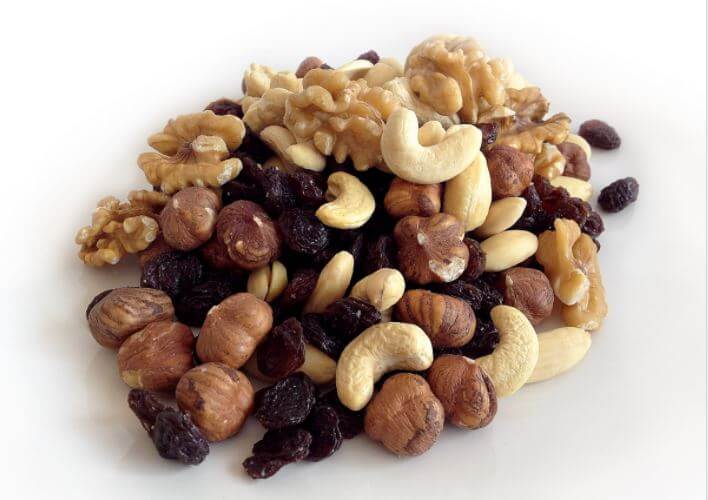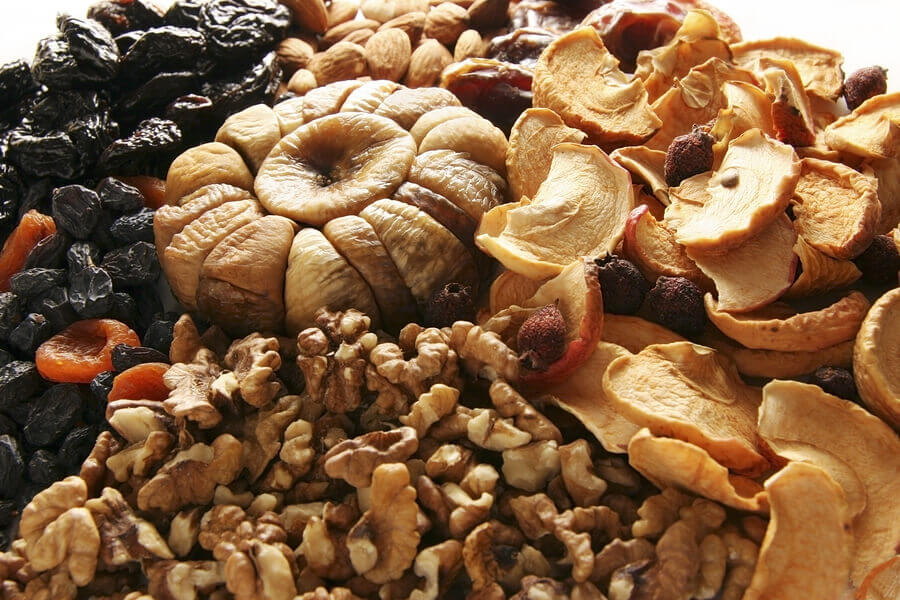The Benefits of Nuts for Cardiovascular Health

Nuts can combine into various food groups. Previously, people analyzed the composition of nuts and they were once classified as legumes because they were seeds, dry and contained fats. However, according to nutritional science, nuts are dry or shell fruits. But, regardless of their classification, it’s clear that they hold plenty of health benefits for us.
Nuts are shell fruits that have an edible portion which comprises at least 50 percent water. Besides, in its natural state shelled or with shell, consumers can also find nuts in other forms as well:
- Toasted: nuts that have been baked in dry heat, shell on.
- Peeled: shelled and skinned.
- Salted: toasted nuts with added salt.
- Peeled and salted: peeled, toasted nuts with added salt.
- Peeled raw: peeled nuts that haven’t been toasted.
Composition of nuts
Nuts are less than 10 percent water, except for chestnuts, which have higher water content. As for carbohydrates, nuts might contain between 13 and 21 percent carbohydrates. Fat content varies greatly depending on the variety. Some nuts are more than 50 percent fat, such as macadamia nuts.
In addition, nuts also have a high protein content, which ranges between 9 and 26 percent, B group vitamins– such as folic acid–, vitamin E, calcium and magnesium.

Nuts and their health benefits
You can find nuts in almost every diet because they’re highly nutritious. They contain heart-healthy fats, rich in polyunsaturated, monounsaturated fatty acids and phytosterols.
Certain observational studies, such as the Harvard Nurse’s Health Study shows a link between lower occurrences of heart disease and frequent nut consumption. These studies mean that eating nuts on a regular basis can be associated with a healthier cardiovascular system.
Predimed also carried out a randomized study on nuts and their health benefits for cardiovascular health. It’s the largest-scale study to date in Spain and is considered to be one of the most important nutritional studies on an international level.
The multicenter study aimed to evaluate the effects of the Mediterranean diet on preventing cardiovascular disease.
The results, published in The New England Journal of Medicine in 2013, concluded that following a Mediterranean diet supplemented with extra-virgin olive oil or nuts can reduce the risk of suffering serious cardiovascular complications in high-risk patients.
These cardiovascular complications, such as heart attack, stroke or brain hemorrhage and cardiovascular death, saw a 30 percent reduction in risk compared to the subjects who followed a low-fat diet. The risk of stroke reduced by 33 percent, heart attack by 20 percent and death (as a cause of a cardiovascular complication) by 31 percent.
In short, adding nuts to your diet can be a great way to improve your overall health.

Recipes to enjoy the health benefits of nuts
Coconut or almond double chocolate chip cookies
Ingredients:
- 4 ounces of coconut or almond flour
- 2 eggs
- 0.7 ounces of dark chocolate (higher than 85% cacao)
- 0.7 ounces of butter
- 1 teaspoon of yeast
- 1 teaspoon of pure fat- and sugar-free cocoa powder

Preparation:
- In a bowl, mix the coconut flour, pure cocoa, and yeast together.
- Next, add the melted butter to the mixture and stir.
- In another bowl, beat the eggs for a few minutes and add to the previous mixture.
- After, add the chocolate and mix for a couple of minutes until a sticky dough forms.
- Now, move the dough into the fridge for 10 minutes, so the butter solidifies. The dough will compact and become easier to handle in order to shape the cookies.
- After 10 minutes, remove the dough from the fridge and make small balls out of it, shaping the cookies. Or, use cookie molds.
- Move the cookies on to a baking sheet and leave enough space in between them to prevent them from forming together. Bake for 5 to 7 minutes in a preheated oven.
As you’ve read with us today, it’s easy to enjoy the benefits of nuts and use them in delicious recipes as well. By eating nuts, you’ll improve your cardiovascular system, which is important for preventing diseases.
Nuts can combine into various food groups. Previously, people analyzed the composition of nuts and they were once classified as legumes because they were seeds, dry and contained fats. However, according to nutritional science, nuts are dry or shell fruits. But, regardless of their classification, it’s clear that they hold plenty of health benefits for us.
Nuts are shell fruits that have an edible portion which comprises at least 50 percent water. Besides, in its natural state shelled or with shell, consumers can also find nuts in other forms as well:
- Toasted: nuts that have been baked in dry heat, shell on.
- Peeled: shelled and skinned.
- Salted: toasted nuts with added salt.
- Peeled and salted: peeled, toasted nuts with added salt.
- Peeled raw: peeled nuts that haven’t been toasted.
Composition of nuts
Nuts are less than 10 percent water, except for chestnuts, which have higher water content. As for carbohydrates, nuts might contain between 13 and 21 percent carbohydrates. Fat content varies greatly depending on the variety. Some nuts are more than 50 percent fat, such as macadamia nuts.
In addition, nuts also have a high protein content, which ranges between 9 and 26 percent, B group vitamins– such as folic acid–, vitamin E, calcium and magnesium.

Nuts and their health benefits
You can find nuts in almost every diet because they’re highly nutritious. They contain heart-healthy fats, rich in polyunsaturated, monounsaturated fatty acids and phytosterols.
Certain observational studies, such as the Harvard Nurse’s Health Study shows a link between lower occurrences of heart disease and frequent nut consumption. These studies mean that eating nuts on a regular basis can be associated with a healthier cardiovascular system.
Predimed also carried out a randomized study on nuts and their health benefits for cardiovascular health. It’s the largest-scale study to date in Spain and is considered to be one of the most important nutritional studies on an international level.
The multicenter study aimed to evaluate the effects of the Mediterranean diet on preventing cardiovascular disease.
The results, published in The New England Journal of Medicine in 2013, concluded that following a Mediterranean diet supplemented with extra-virgin olive oil or nuts can reduce the risk of suffering serious cardiovascular complications in high-risk patients.
These cardiovascular complications, such as heart attack, stroke or brain hemorrhage and cardiovascular death, saw a 30 percent reduction in risk compared to the subjects who followed a low-fat diet. The risk of stroke reduced by 33 percent, heart attack by 20 percent and death (as a cause of a cardiovascular complication) by 31 percent.
In short, adding nuts to your diet can be a great way to improve your overall health.

Recipes to enjoy the health benefits of nuts
Coconut or almond double chocolate chip cookies
Ingredients:
- 4 ounces of coconut or almond flour
- 2 eggs
- 0.7 ounces of dark chocolate (higher than 85% cacao)
- 0.7 ounces of butter
- 1 teaspoon of yeast
- 1 teaspoon of pure fat- and sugar-free cocoa powder

Preparation:
- In a bowl, mix the coconut flour, pure cocoa, and yeast together.
- Next, add the melted butter to the mixture and stir.
- In another bowl, beat the eggs for a few minutes and add to the previous mixture.
- After, add the chocolate and mix for a couple of minutes until a sticky dough forms.
- Now, move the dough into the fridge for 10 minutes, so the butter solidifies. The dough will compact and become easier to handle in order to shape the cookies.
- After 10 minutes, remove the dough from the fridge and make small balls out of it, shaping the cookies. Or, use cookie molds.
- Move the cookies on to a baking sheet and leave enough space in between them to prevent them from forming together. Bake for 5 to 7 minutes in a preheated oven.
As you’ve read with us today, it’s easy to enjoy the benefits of nuts and use them in delicious recipes as well. By eating nuts, you’ll improve your cardiovascular system, which is important for preventing diseases.
All cited sources were thoroughly reviewed by our team to ensure their quality, reliability, currency, and validity. The bibliography of this article was considered reliable and of academic or scientific accuracy.
- Belanger, C. F., Hennekens, C. H., Rosner, B., & Speizer, F. E. (1978). The nurses’ health study. Am J Nurs, 78(6), 1039-1040.
- Martínez-González, M. Á., Corella, D., Salas-Salvadó, J., Ros, E., Covas, M. I., Fiol, M., … & Lapetra, J. (2010). Cohort profile: design and methods of the PREDIMED study. International journal of epidemiology, 41(2), 377-385.
- Estruch, R., Ros, E., Salas-Salvadó, J., Covas, M. I., Corella, D., Arós, F., … & Lamuela-Raventos, R. M. (2013). Primary prevention of cardiovascular disease with a Mediterranean diet. New England Journal of Medicine, 368(14), 1279-1290.
- Estruch, R., Ros, E., Salas-Salvadó, J., Covas, M. I., Corella, D., Arós, F., … & Lamuela-Raventos, R. M. (2013). Primary prevention of cardiovascular disease with a Mediterranean diet. New England Journal of Medicine, 368(14), 1279-1290.
This text is provided for informational purposes only and does not replace consultation with a professional. If in doubt, consult your specialist.








